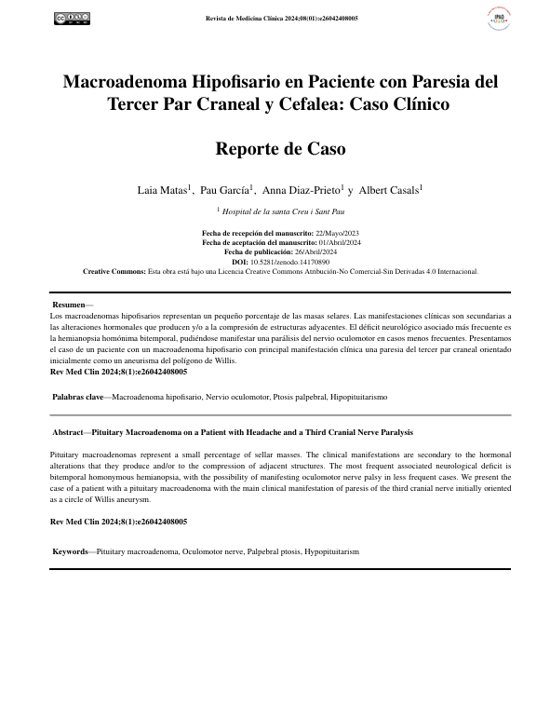Abstract
Pituitary macroadenomas represent a small percentage of sellar masses. The clinical manifestations are secondary to the hormonal alterations that they produce and/or to the compression of adjacent structures. The most frequent associated neurological deficit is bitemporal homonymous hemianopsia, with the possibility of manifesting oculomotor nerve palsy in less frequent cases. We present the case of a patient with a pituitary macroadenoma with the main clinical manifestation of paresis of the third cranial nerve initially oriented as a circle of Willis aneurysm.
References
Daly AF, Beckers A. The Epidemiology of Pituitary Adenomas. Endocrinol Metab Clin North Am. 2020 Sep;49(3):347-355. doi: 10.1016/j.ecl.2020.04.002
Ezzat S, Asa SL, Couldwell WT, Barr CE, Dodge WE, Vance ML, McCutcheon IE. The prevalence of pituitary adenomas: a systematic review. Cancer. 2004 Aug 1;101(3):613-9. doi: 10.1002/cncr.20412
Molitch ME. Nonfunctioning pituitary tumors and pituitary incidentalomas. Endocrinol Metab Clin North Am. 2008 Mar;37(1):151-71, xi. doi: 10.1016/j.ecl.2007.10.011.
Keane JR, Ahmadi J. Most diabetic third nerve palsies are peripheral. Neurology. 1998 Nov;51(5):1510. doi: 10.1212/wnl.51.5.1510
Ikeda K, Tamura M, Iwasaki Y, Kinoshita M. Relative pupil-sparing third nerve palsy: etiology and clinical variables predictive of a mass. Neurology. 2001 Nov 13;57(9):1741-2. doi: 10.1212/wnl.57.9.1741.
Di Iorgi N et al. The use of neuroimaging for assessing disorders of pituitary development. Clin Endocrinol (Oxf). 2012 Feb;76(2):161-76. doi: 10.1111/j.1365-2265.2011.04238.x.
Gsponer J et al. Diagnosis, treatment, and outcome of pituitary tumors and other abnormal intrasellar masses. Retrospective analysis of 353 patients. Medicine (Baltimore). 1999 Jul;78(4):236-69. doi: 10.1097/00005792-199907000-00004.

This work is licensed under a Creative Commons Attribution-NonCommercial-NoDerivatives 4.0 International License.
Copyright (c) 2024 Laia Matas, Pau García, Anna Diaz-Prieto, Albert Albert

